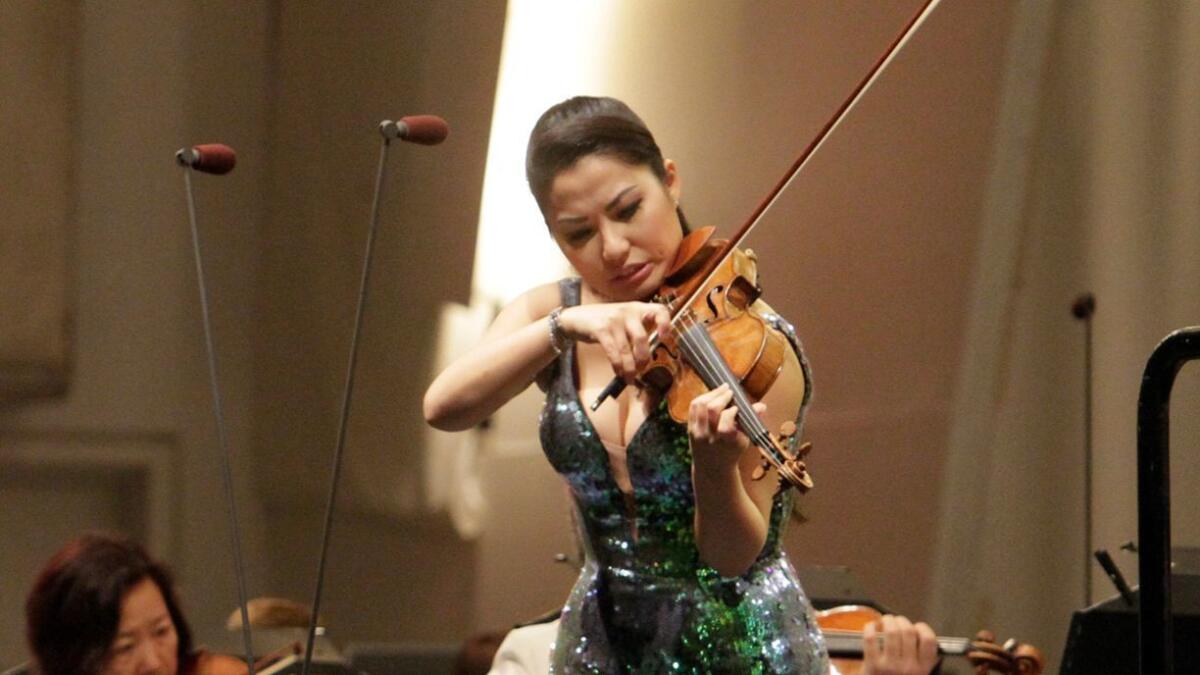PKF-Prague Philharmonia delivers Dvorak, played with precision

- Share via
Nearing the end of a three-week U.S. tour, an orchestra going by the name of PKF-Prague Philharmonia rolled through the Soka Performing Arts Center in Aliso Viejo on Thursday night, on its way to Davis and San Francisco.
Founded in 1994 by the conductor Jiri Belohlavek, the orchestra only recently added the abbreviation to its name; it stands for Prazskz Komorní Filharmonie, or Prague Chamber Philharmonia. The energetic French conductor Emmanuel Villaume, who led the group here, has been its music director since 2015.
It’s a nifty ensemble. Some 60 strong at full strength at Soka, it lies partway between a chamber orchestra and a full-size symphony orchestra. The string section — 12 first violins and 10 seconds, and four double basses — is large enough to have some sonorous meat on its bones without losing the clarity and intimacy of smaller ensembles. And as a whole, the orchestra seemed a perfect size for Soka, where larger orchestras can overcharge the acoustics at fortissimo dynamics.
SIGN UP for the free Essential Arts & Culture newsletter »
Here it provided a tailor fit for the Czechs.The musicians brought music from the homeland, which is to say Smetana and Dvorak. And while one was grateful for the opportunity to hear these pieces performed in authentic style and that the Dvorak symphony offered wasn’t the ubiquitous “From the New World,” a piece by a Czech composer from a more recent era — Janácek, Martinu, Husa — would have made a welcome addition to the program.
As it was, though, the concert provided little reason to complain, especially the finale, Dvorak’s Symphony No. 8, in a gem of a performance. Usually considered a folksy and rustic work with some ruggedness thrown in here and there, Villaume and the orchestra fashioned an overtly dramatic account of almost Mahlerian proportions.
Villaume has considerable experience in the theater; he is also music director of Dallas Opera, and in March he conducts Gounod at the Metropolitan Opera in New York. At Soka he worked in a theatrical manner, using big and vigorous motions as if he had to be seen onstage from a pit.
The orchestra didn’t overreact, but it certainly paid abiding attention to his urging. The symphony unwound in a range of articulation, accent and nuance. Melodic phrases were ever supple. Dynamic contrasts were huge.
The PKF showed a wonderful precision (even in slow passages) and easy cohesion. The strings had a bright, even brilliant sound, but were never brittle. The winds and brass displayed some piquant colors, crystalline flutes, faraway oboes, peppery horns. Only in a couple fortes did the brass blanket the rest of the orchestra.
At concerto time, the star arrived. Violinist Sarah Chang chose the neglected Violin Concerto by Dvorak as her vehicle, a welcome change from the norm. It’s a big, Brahmsian piece with the expected Slavic overtones, good tunes and plenty of virtuosic pizzazz. Hard to understand its rarity.
Though her unswerving musical intensity served the piece pretty well, Chang still overdid it. She seemed to view the piece as an athletic challenge and dug into the strings nonstop. She wrestled and conquered phrases rather than coaxed them, and she preferred husky tone over sweet. Coupled with her stage demeanor — the constant strolling and leg kicks, the wiggling out of wrists, the extravagant releases of the bow — it proved a harsh and mannered performance. Villaume kept his eyes on her, though, and the orchestra stayed right with her.
The concert opened with that old standby, “The Moldau” by Smetana. Far from a bucolic travelogue in soft focus, the piece became a vivid journey in Technicolor; one practically felt the spray in one’s face and the unsteady boat underfoot.
Despite a big crowd and a standing ovation, there was no encore. The musicians all had worked hard enough.
Follow The Times’ arts team @culturemonster.
ALSO
Times music critic Mark Swed’s latest reviews
The accidental opera star: ‘A lot of the purists, they don’t believe my story’
More to Read
The biggest entertainment stories
Get our big stories about Hollywood, film, television, music, arts, culture and more right in your inbox as soon as they publish.
You may occasionally receive promotional content from the Los Angeles Times.










